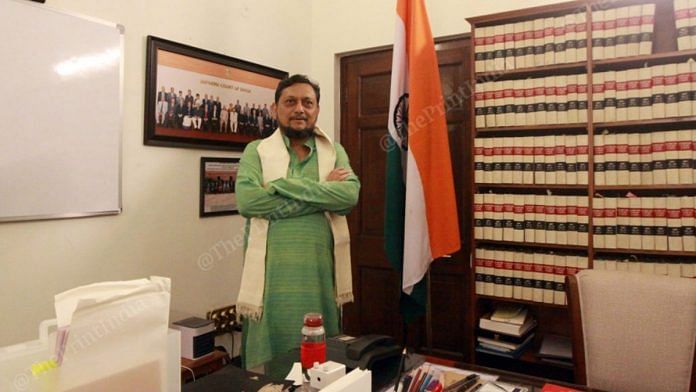New Delhi: Chief Justice of India (CJI) S.A. Bobde Thursday suggested use of rubber bullets to ward off wild animals instead of culling them to save standing crops.
CJI Bobde’s remark came when a bench, led by him, was hearing a petition filed by Biju Janata Dal (BJD) MP Anubhav Mohanty against the permission given by some states to kill nilgais as a preventive measure to save crops.
In his petition, Mohanty has criticised the move to incentivise killing of vermin such as nilgais, rhesus macaques and wild boars.
“We are treating this matter with anxiety. What if wild animals destroy farm lands? Can a tiger or rogue elephant destroying crops be killed or not? But yet, killing of 50 nilgais is not justified,” the CJI noted.
The bench issued notices to the states and asked Mohanty’s lawyer, senior advocate Siddhartha Luthra, to propose “other options” of scaring away animals.
“There are rubber bullets that can be used,” the CJI observed, before adding that a “man-eating animal should be killed, there is no doubt about that”.
The CJI also asked the BJD MP to find out what forest officials have done to tackle human-animal conflict. Mohanty was further asked to examine whether such conflicts have increased because of encroachment of forest land.
Also read: Elephant or wild pig, none should die in blast. Cuteness quotient must not guide conservation
‘States rewarding those planting bombs in forest’
Mohanty, a Lok Sabha MP from Odisha’s Kendrapara, has sought appropriate directions from the top court against the practice of encouraging and rewarding wild animal killing in India.
According to him, states are rewarding those who plant bombs and poisoned baits inside forest areas to kill vermin.
Mohanty’s petition contains documented instances of “heinous practices”, such as snares, explosives, bomb and poison baits, to ward off animals. In one such instance, the petition states, a child had also succumbed to injuries during an explosion.
In the absence of proper guidelines to deal with human-animal conflict, Mohanty wants the court to work out a “proactive, constructive and a scientific way” to mitigate it.
His petition also gives data released by the forest department of Kerala, which states that 24 tigers and 110 leopards were killed by wire snares in the state between 2012 and 2020. “It has the potential to cause grievous injuries to humans as well,” the petition states.
Not the first animal-related case for CJI Bobde
This isn’t the first time that CJI Bobde has expressed concern for animals.
In January, a bench led by him had noted that “the elephant is a gentleman” and humans should give way to it. The court had then expressed willingness to uphold an order of the Tamil Nadu government notifying the Nilgiris elephant corridor.
The CJI had also cited rampant poaching of rhinos in Assam to disallow building of resorts near forests, especially in the elephant corridors.
The apex court had observed that it cannot allow anyone to create trouble for elephants since these animals may face the threat of extinction if illegal activities are not contained on time.
Last month, a CJI Bobde-led bench took cognisance of a petition that brought to light the death of a pregnant elephant in Kerala. The elephant had succumbed to injuries after it allegedly consumed a pineapple stuffed with firecrackers.
The court had issued notices to all states on a petition seeking a standard operating procedure (SOP) to avoid repetition of a similar incident and also fill up vacancies in forest forces across the country.
In June again, CJI Bobde commented on a dichotomy in the Prevention of Cruelty to Animals Act 1960 (PCA) that permits killing of an animal but does not allow cruelty towards it.
PCA exempts killing of animals for food from punishment if it was done without inflicting unnecessary pain and suffering. The CJI’s remarks had come on a petition raising questions over the validity of the Kerala Animals and Bird Sacrifices Prohibition Act, 1968, which bars animal sacrifices in temples of the state.
Also read: Human-animal conflict is clear & present danger, and India can’t afford to ignore it



